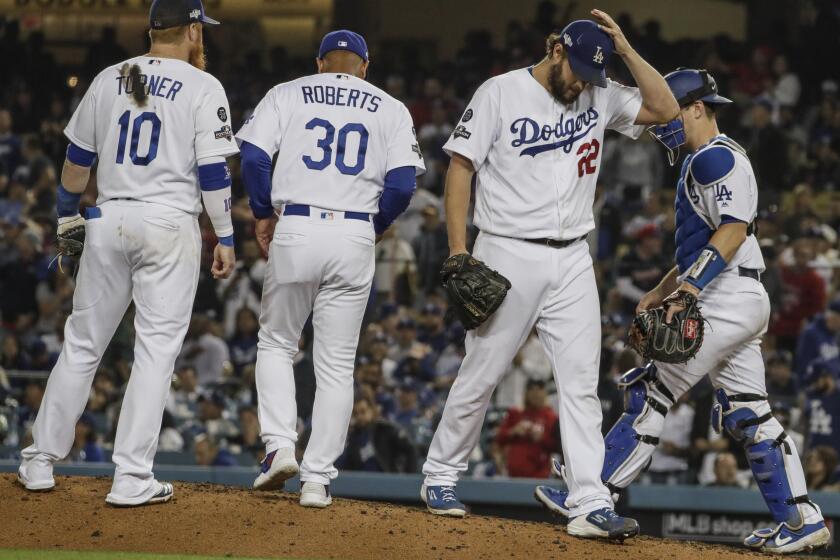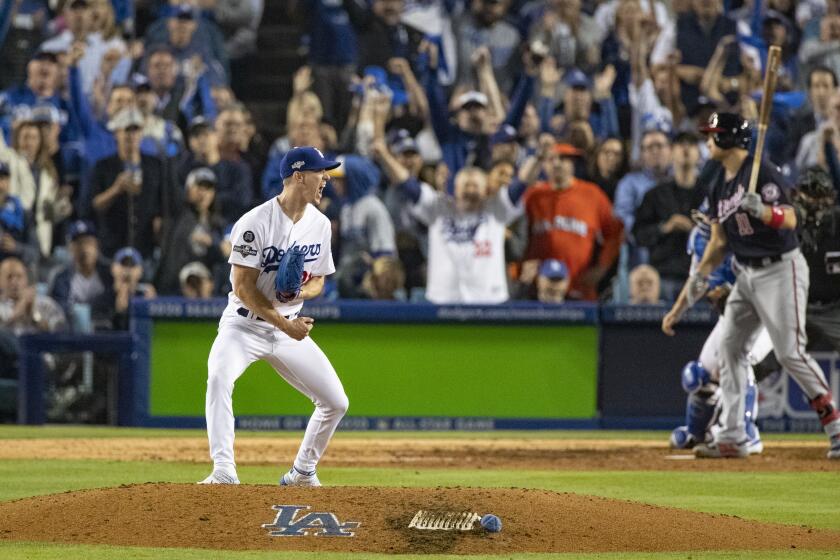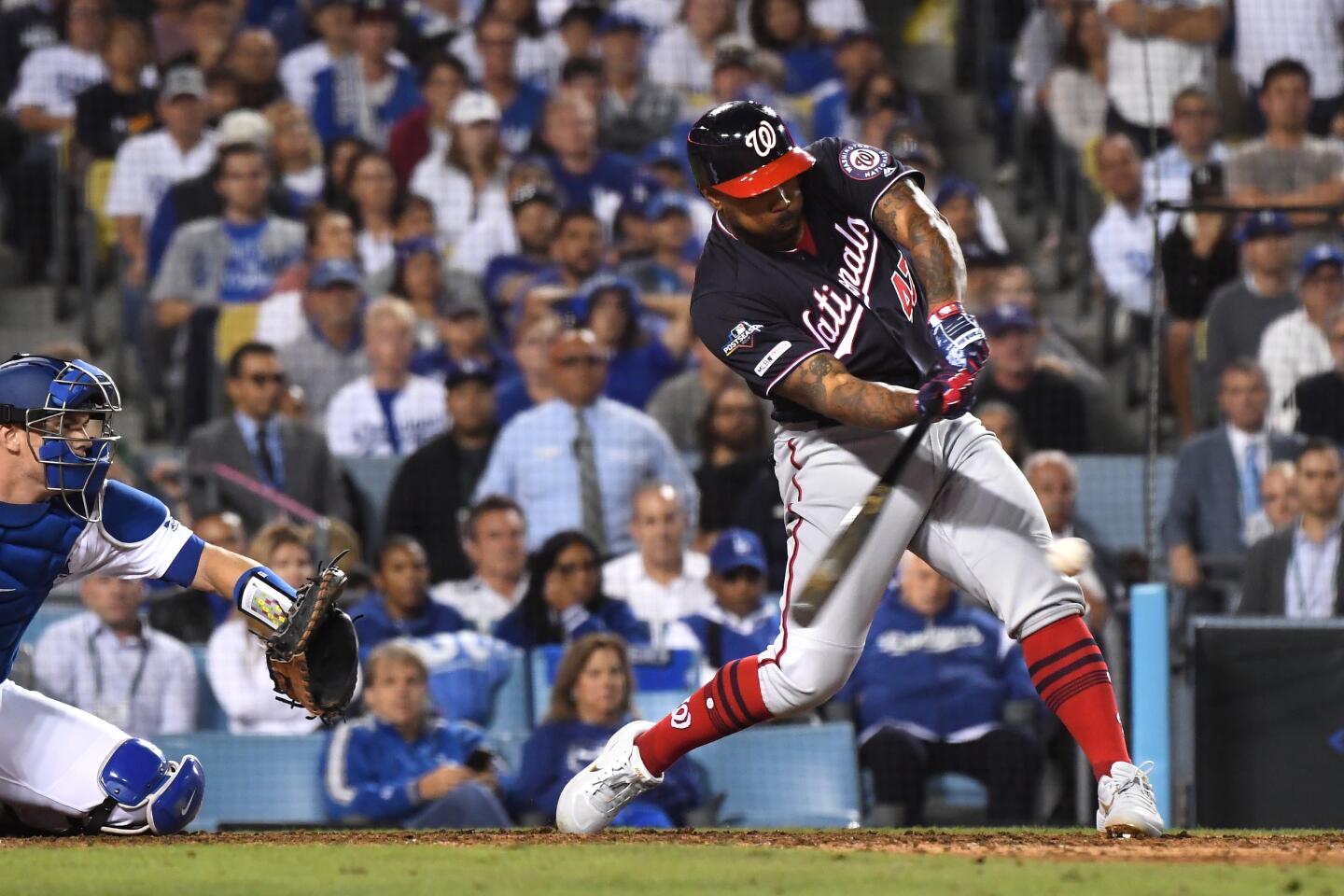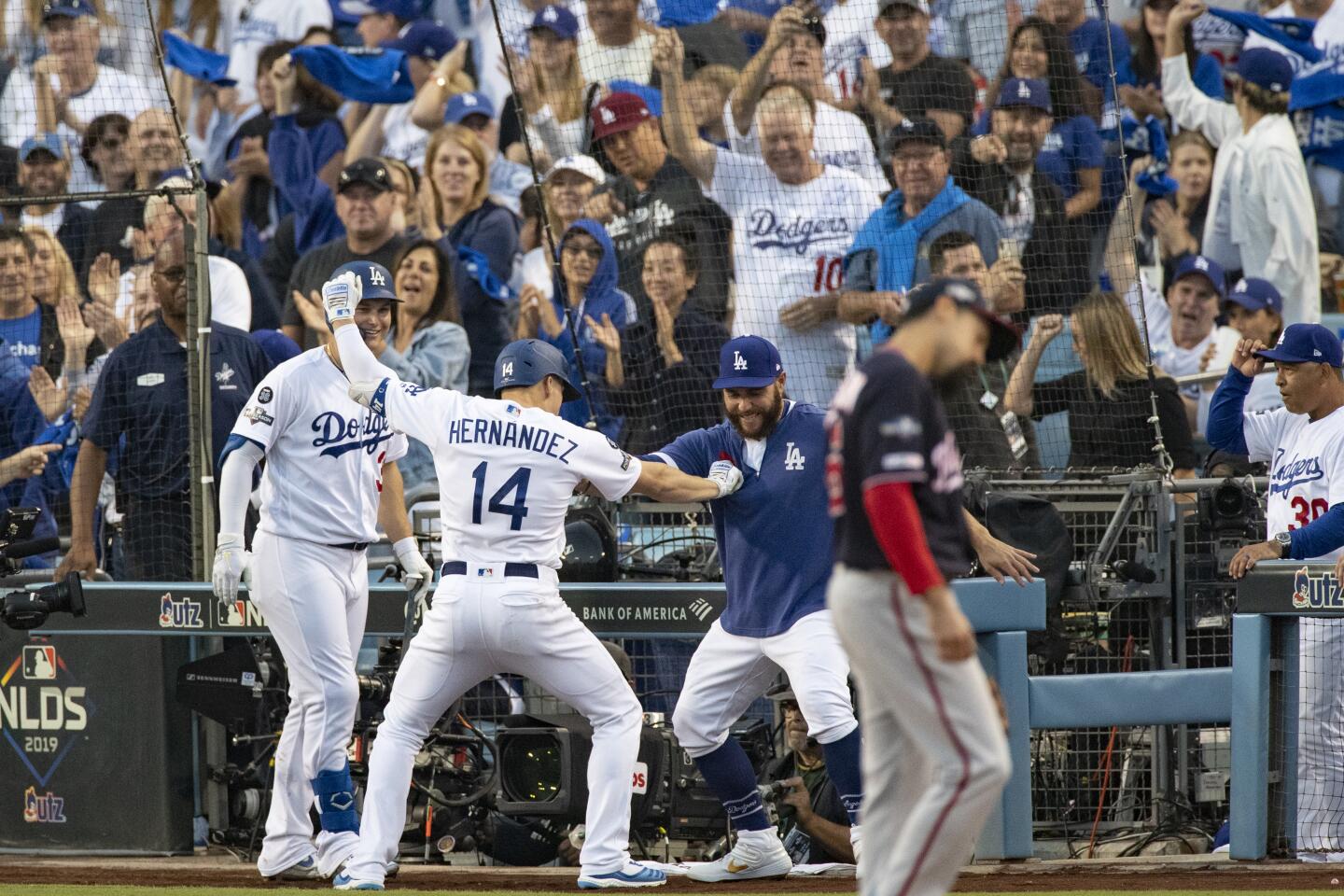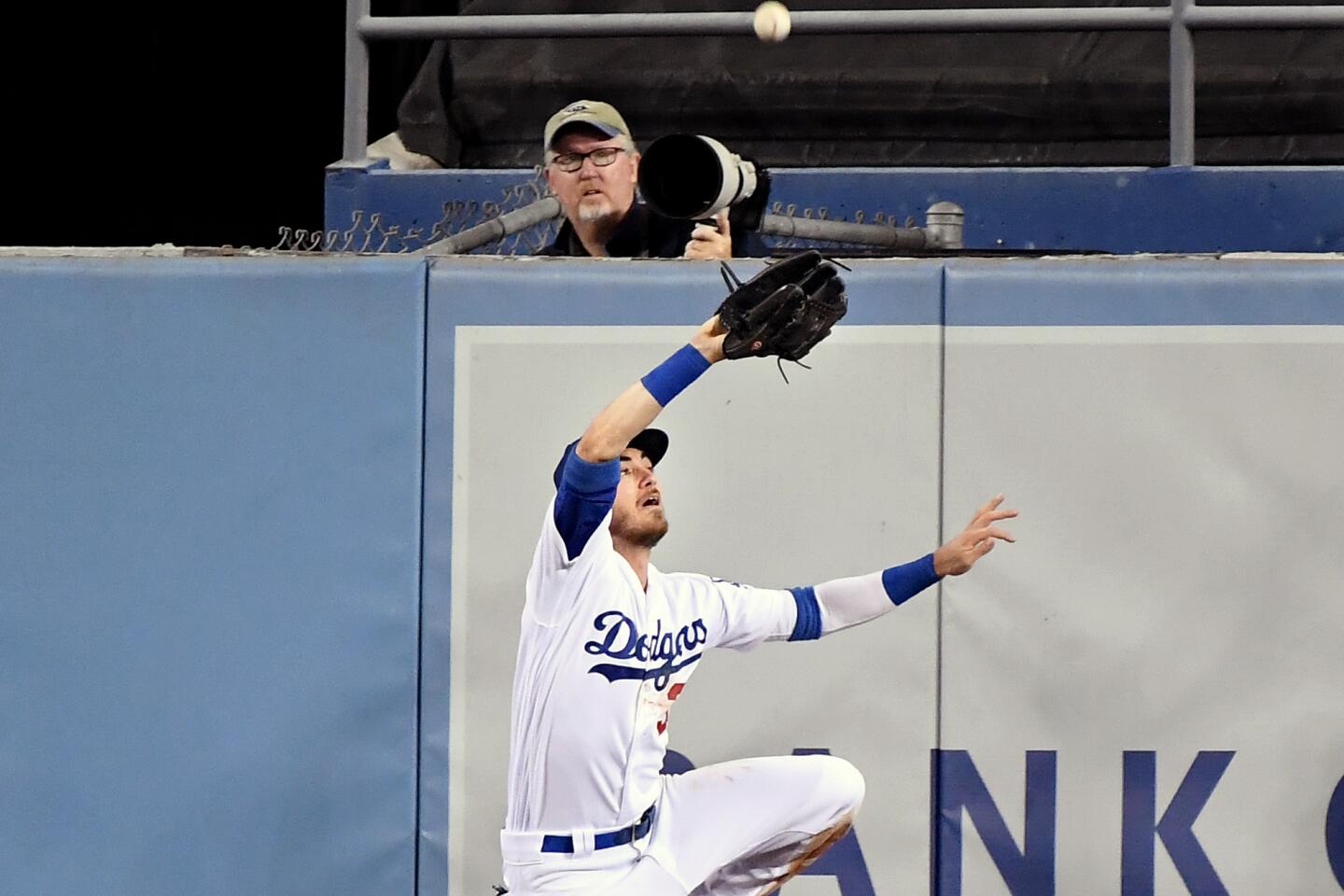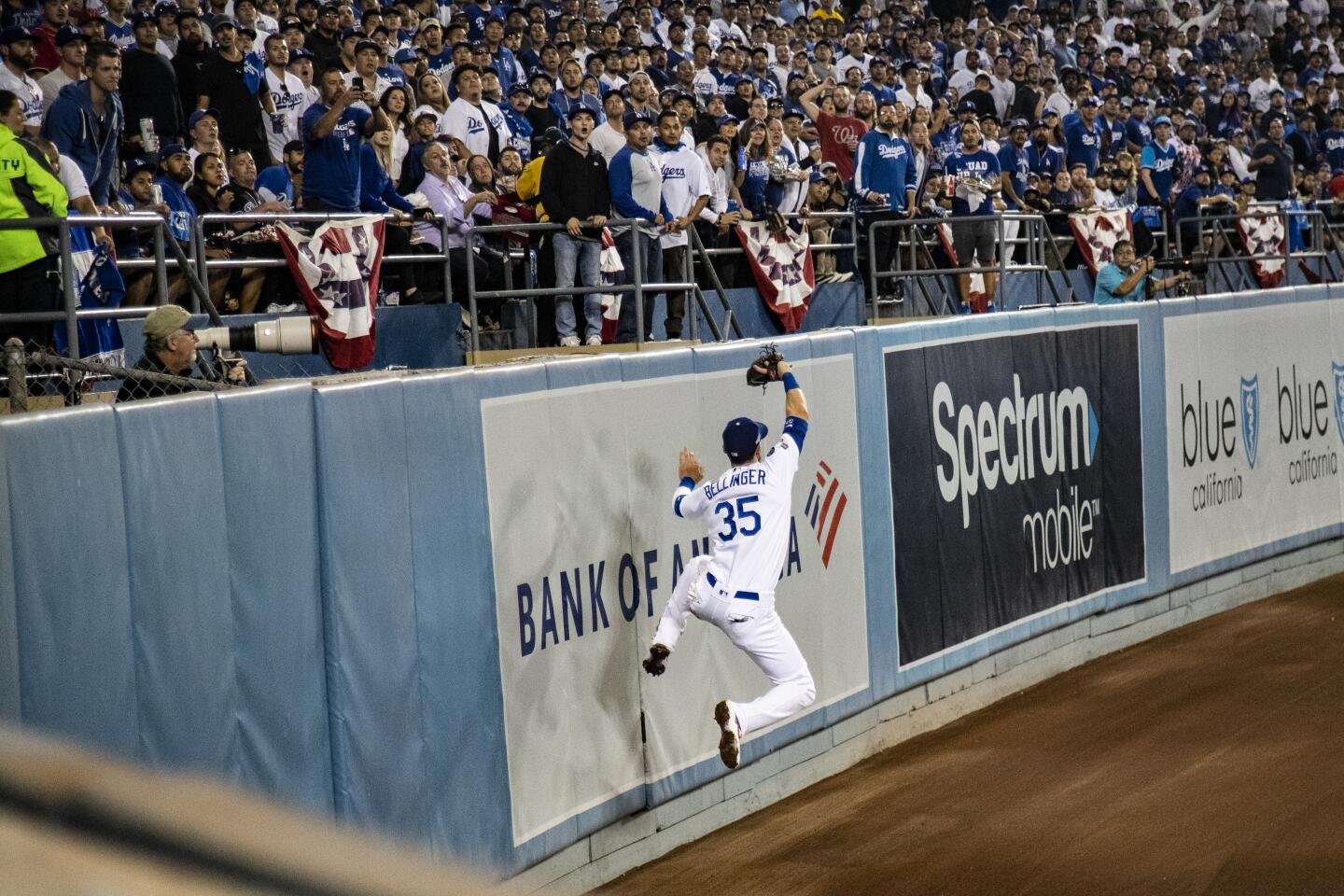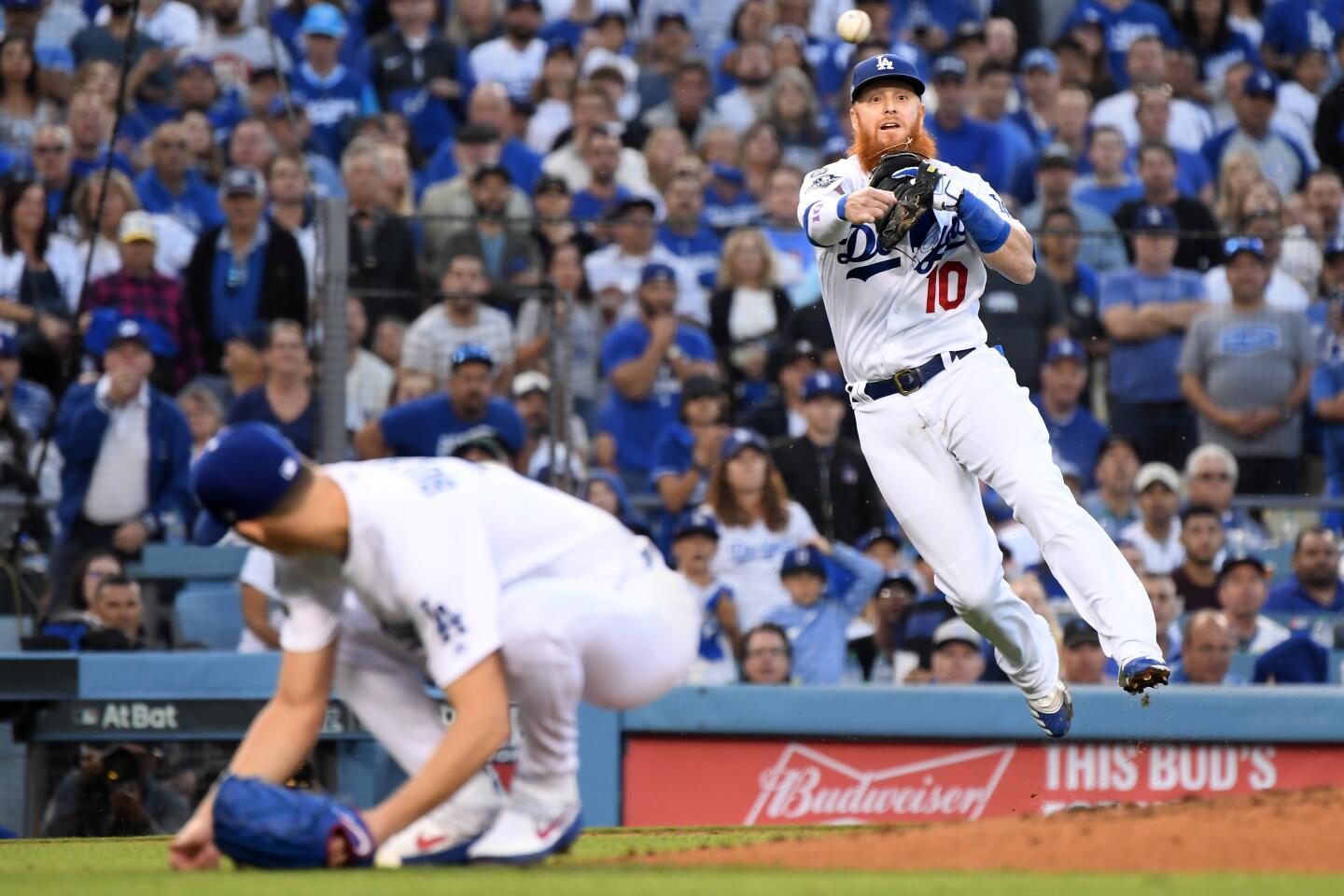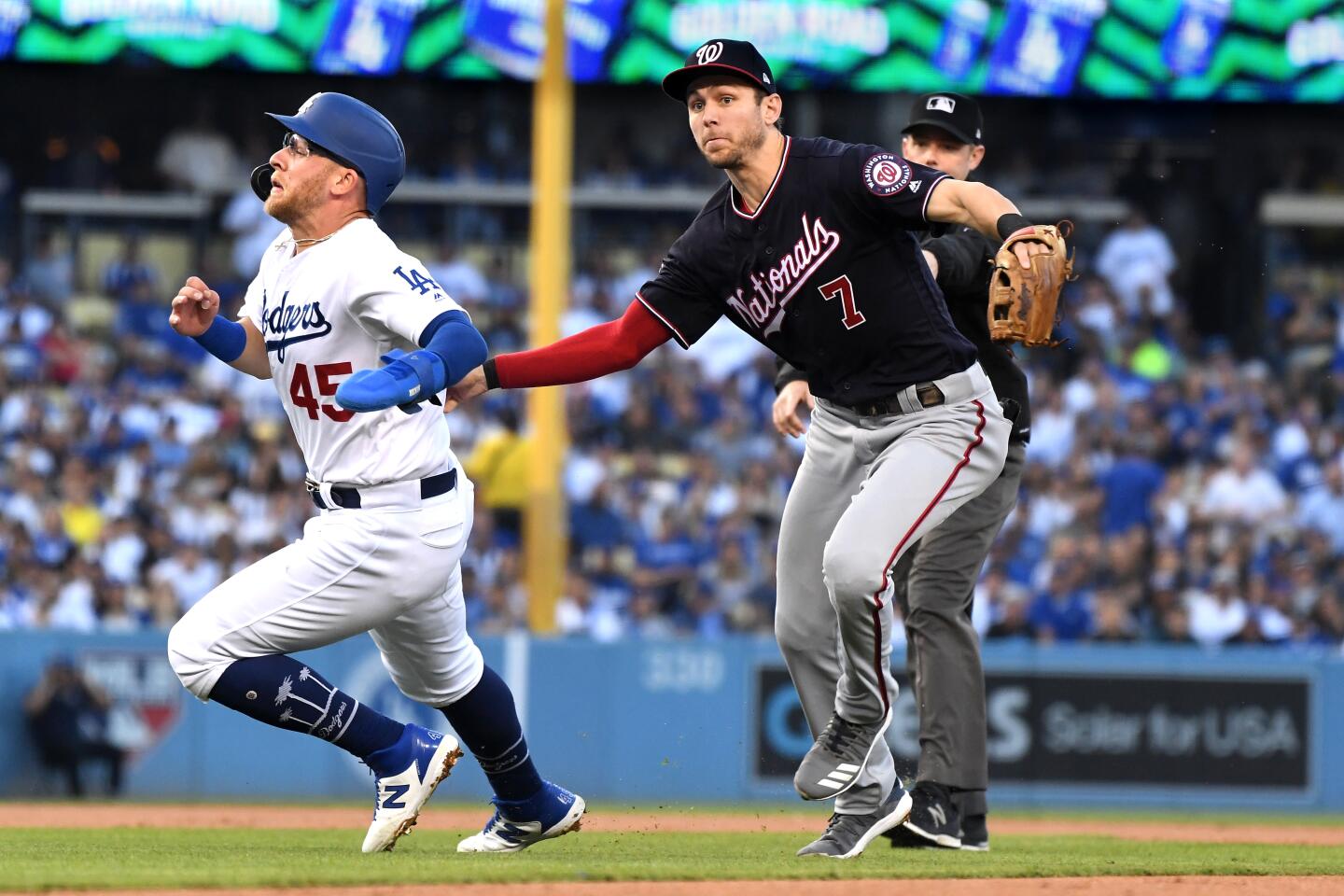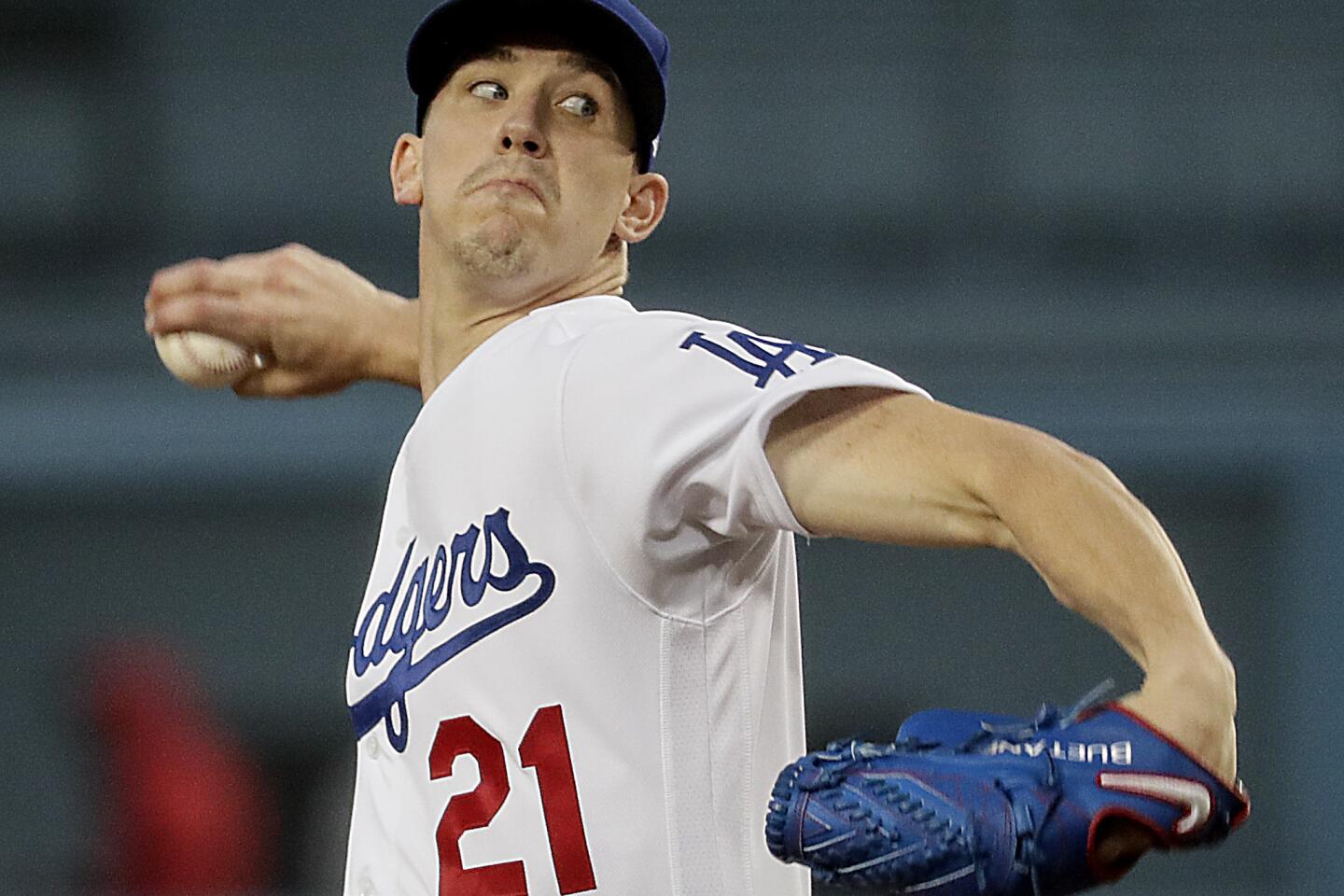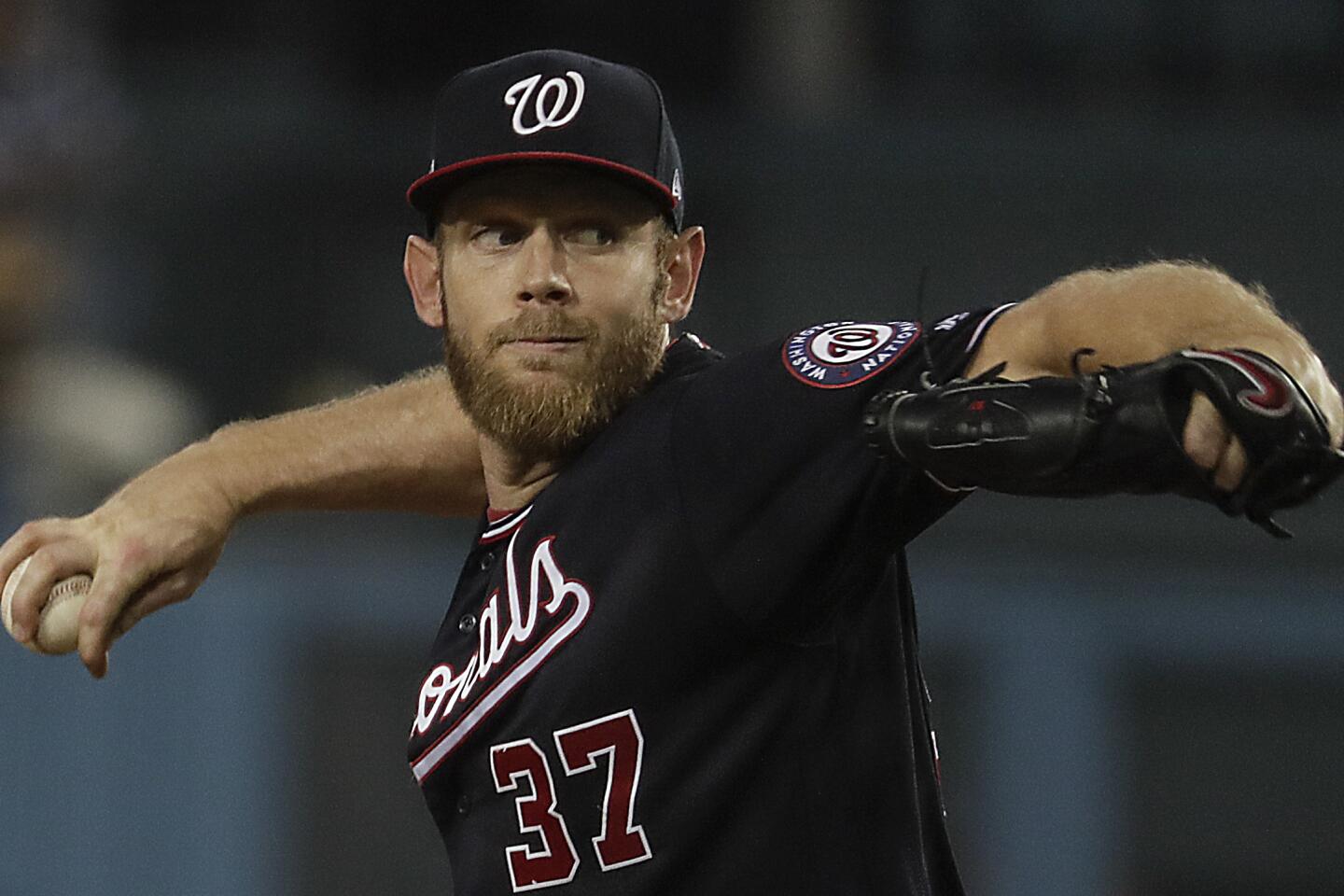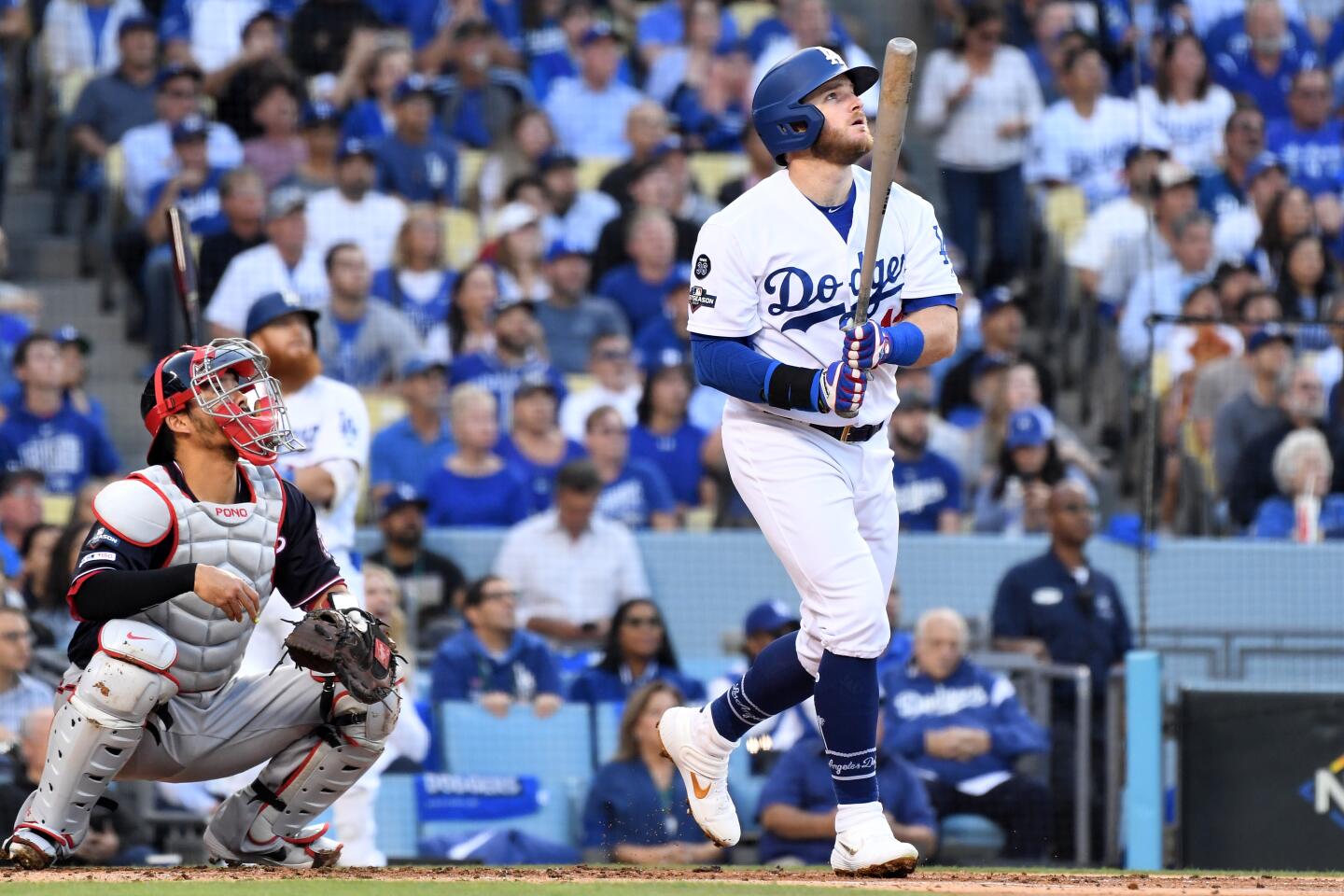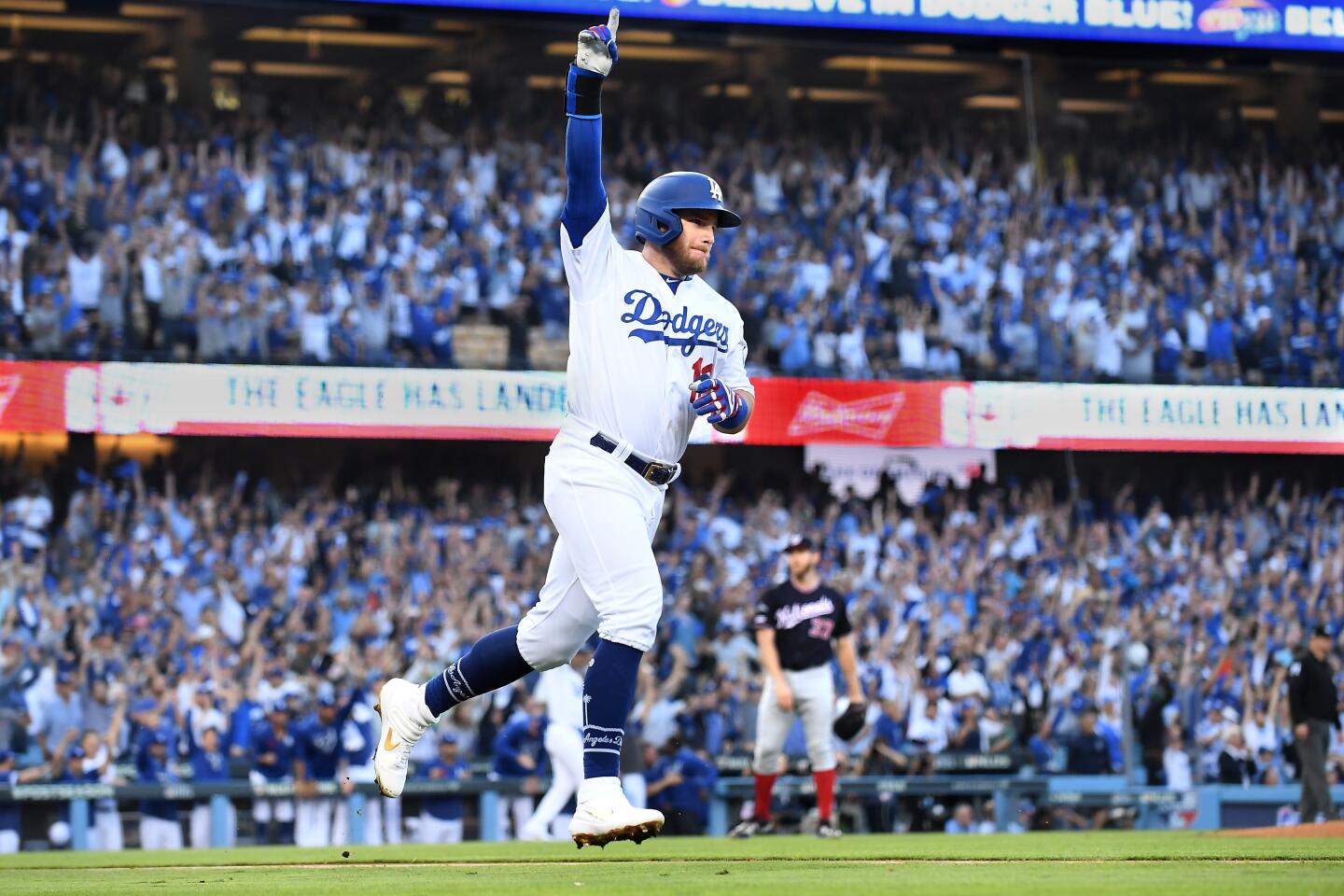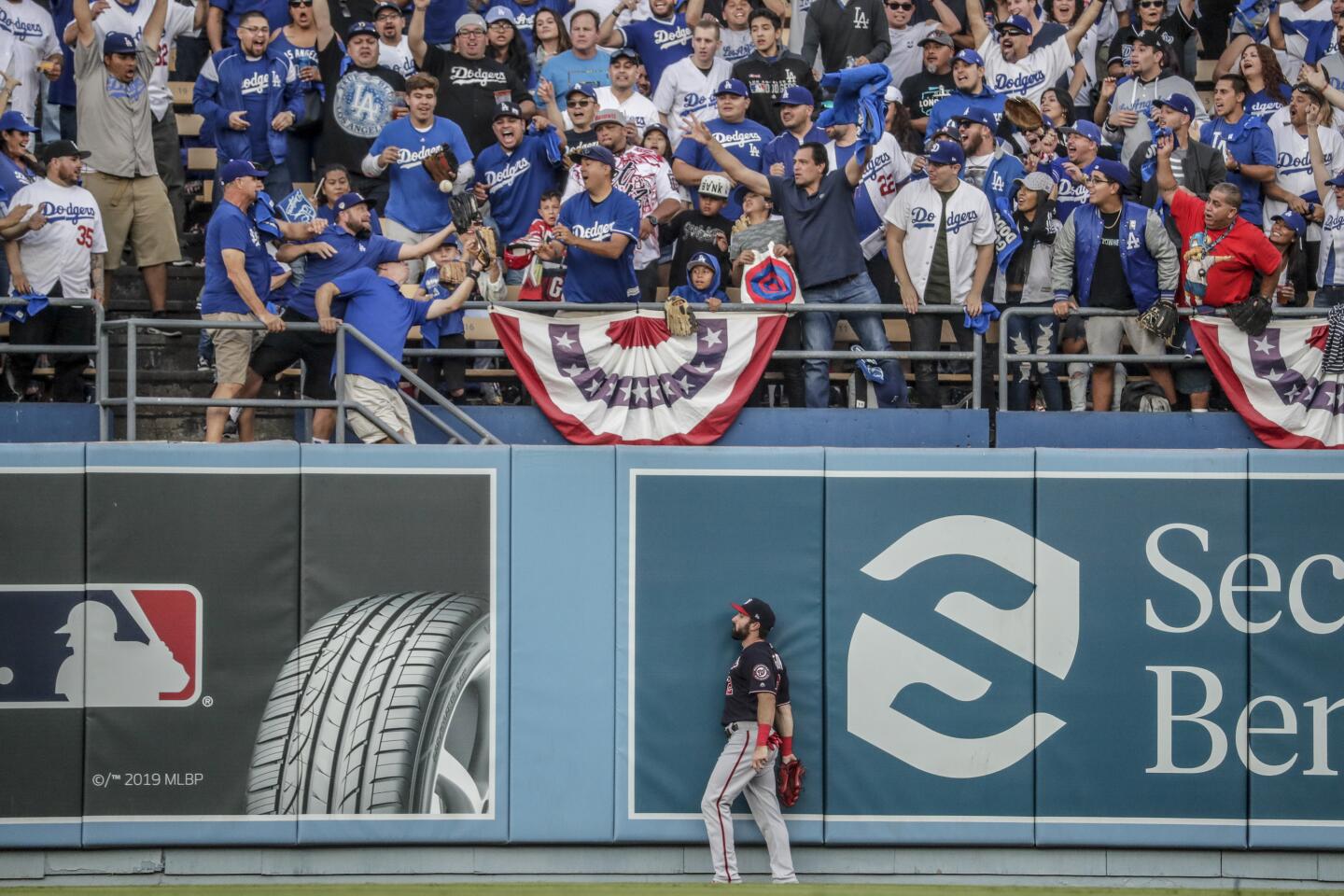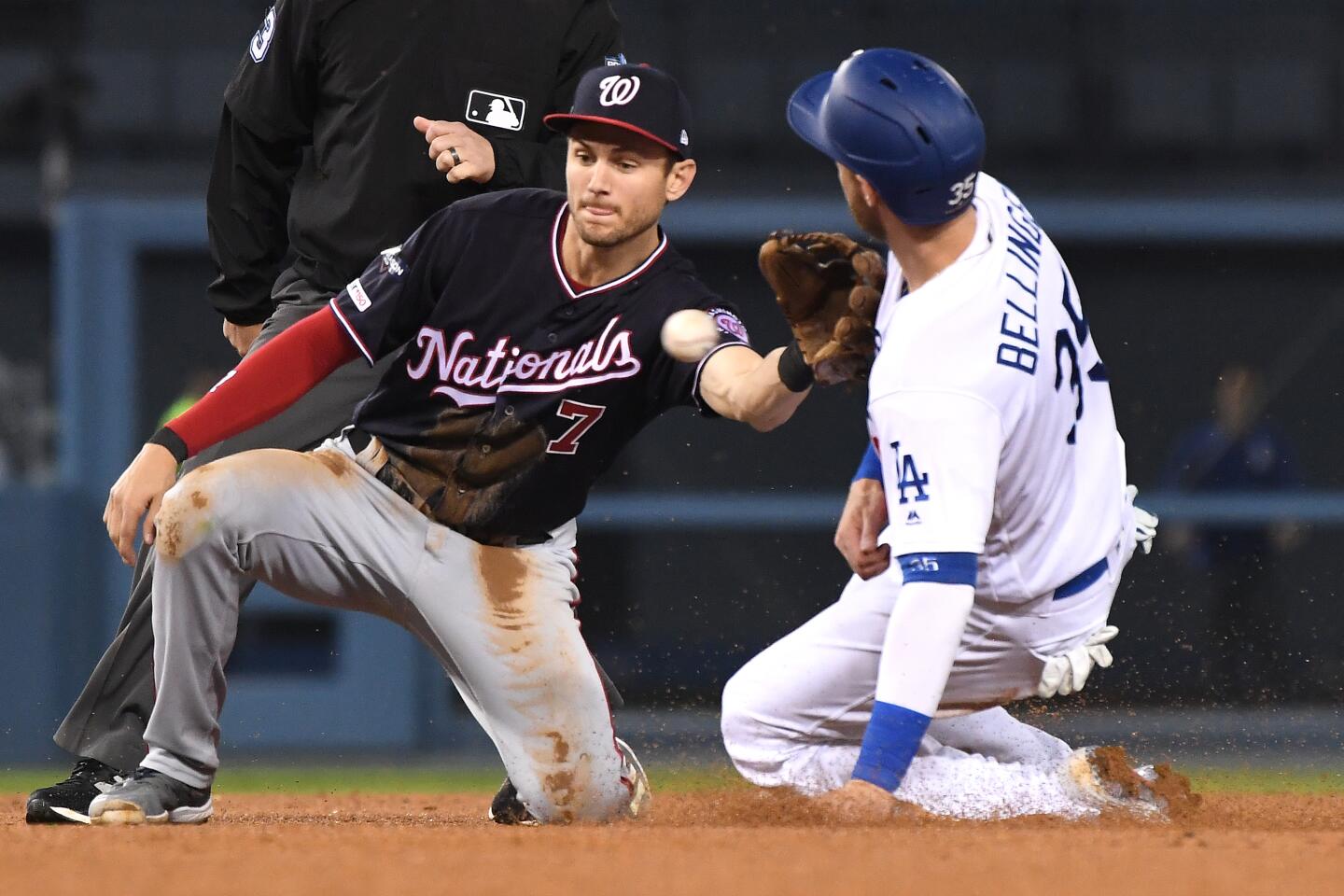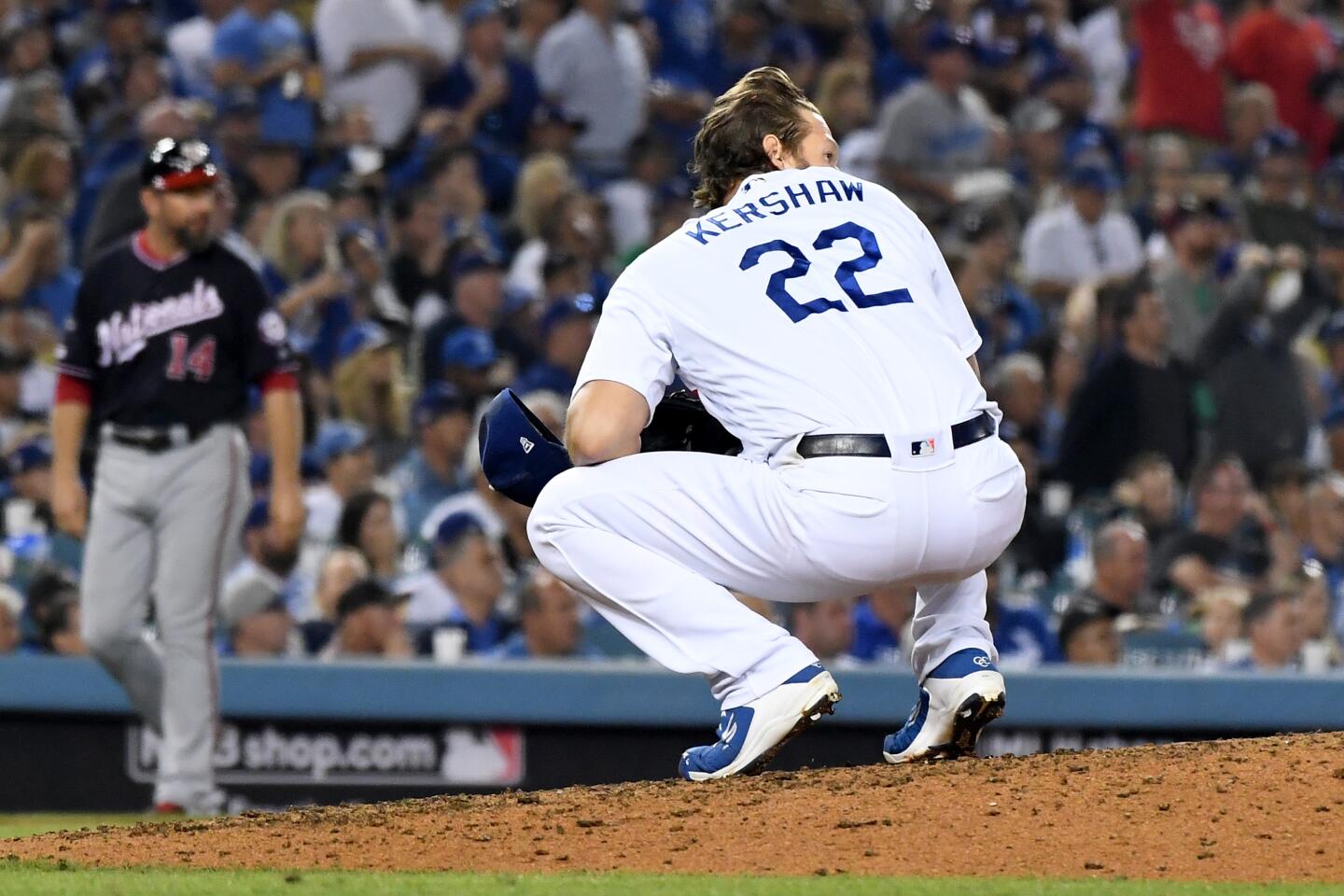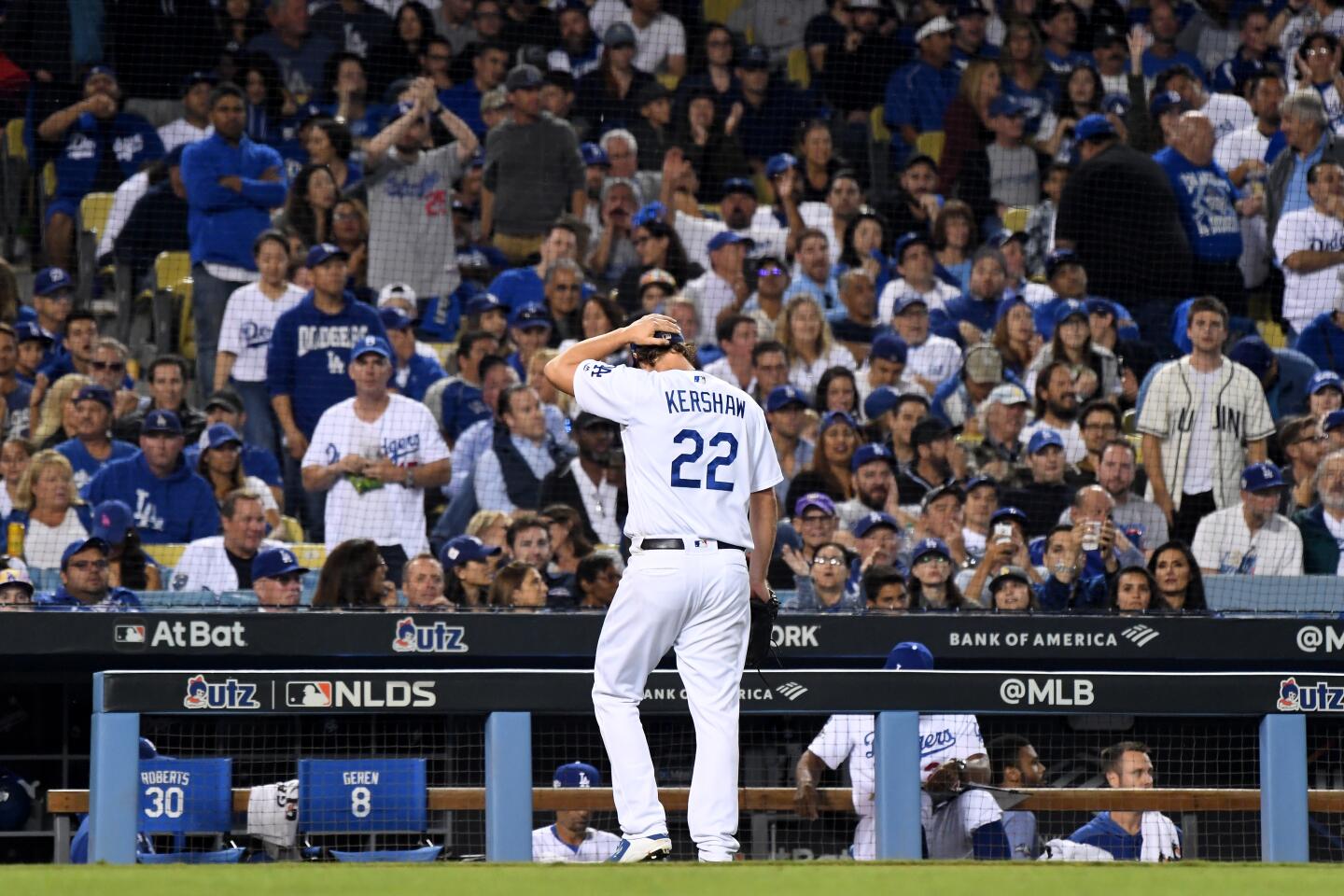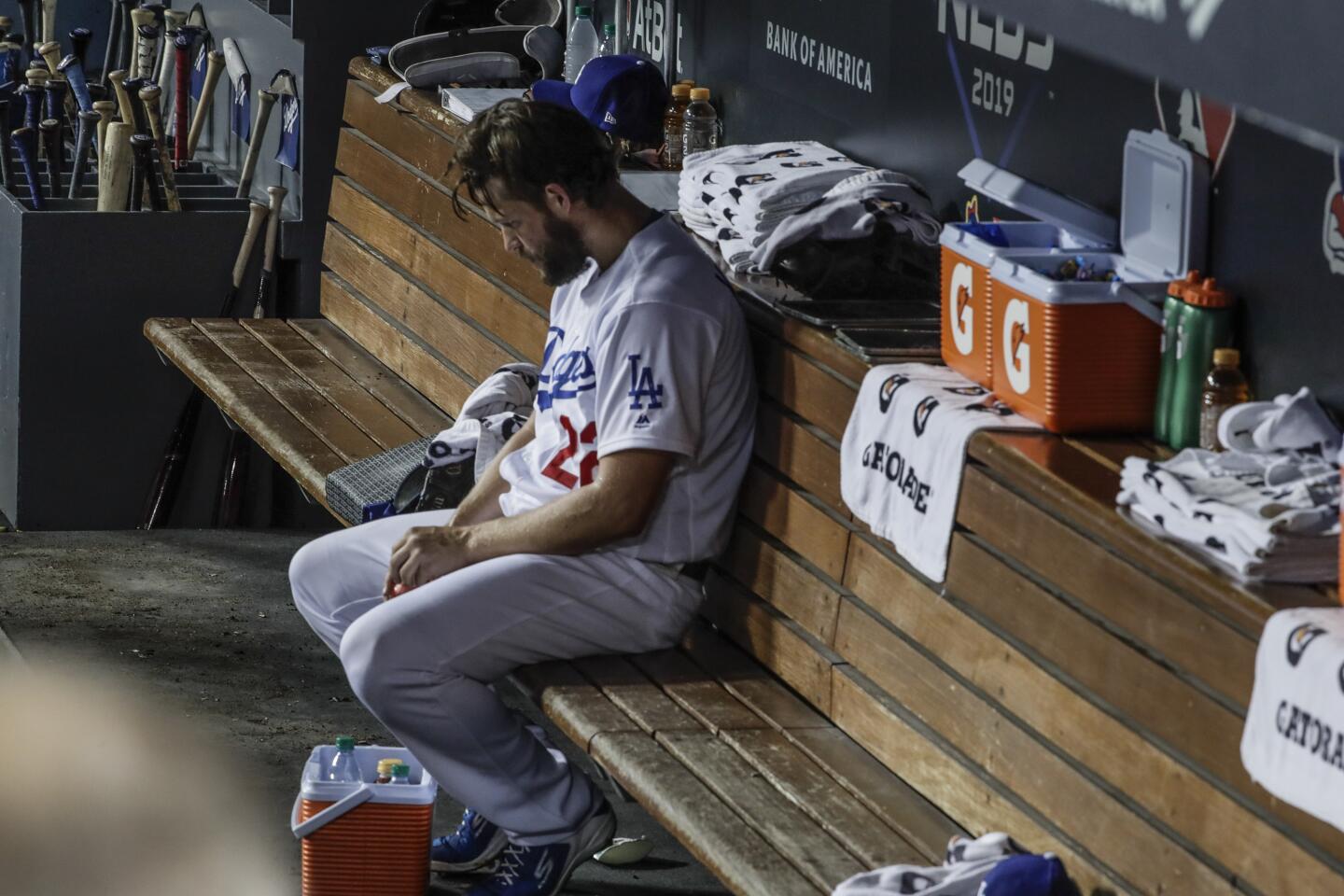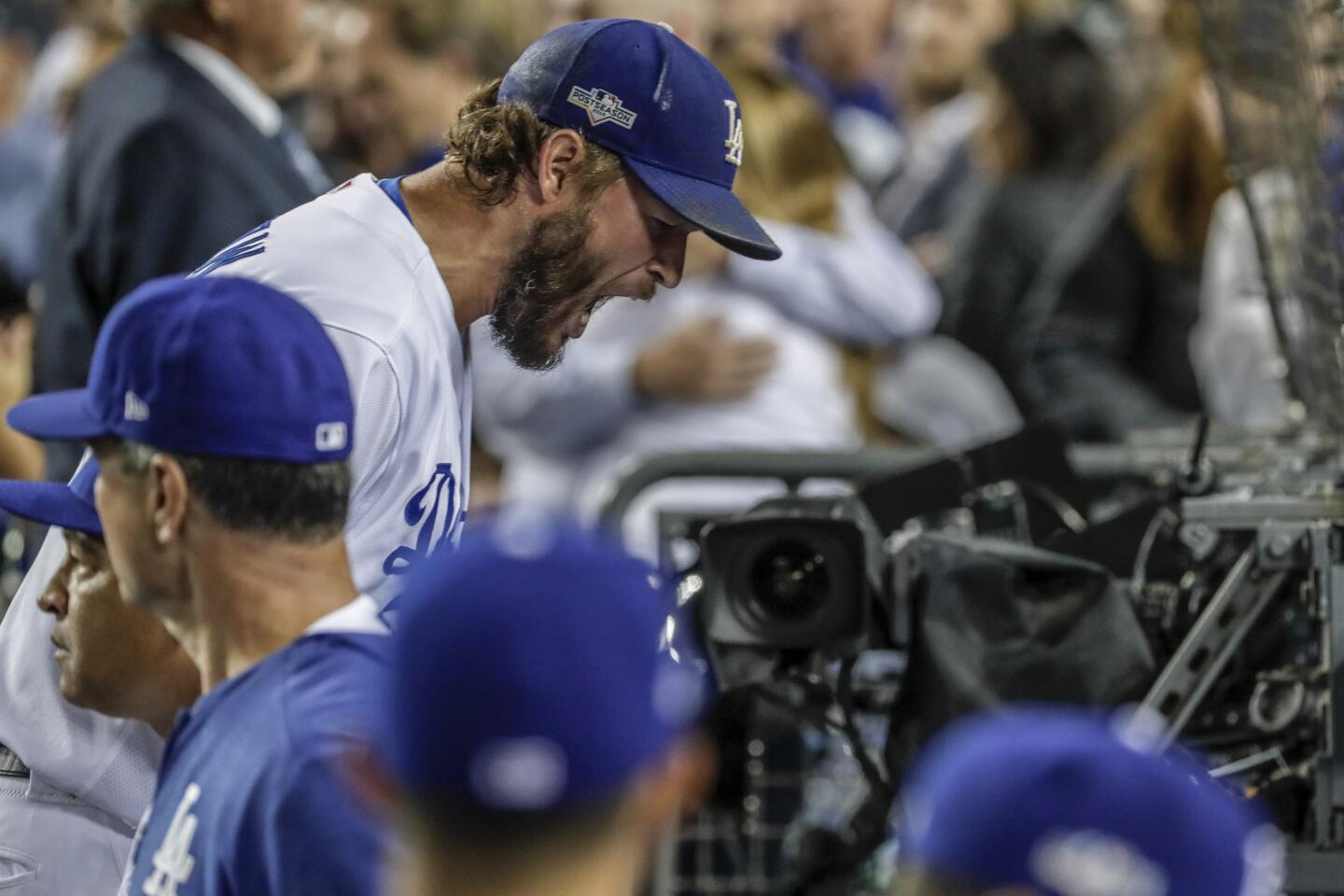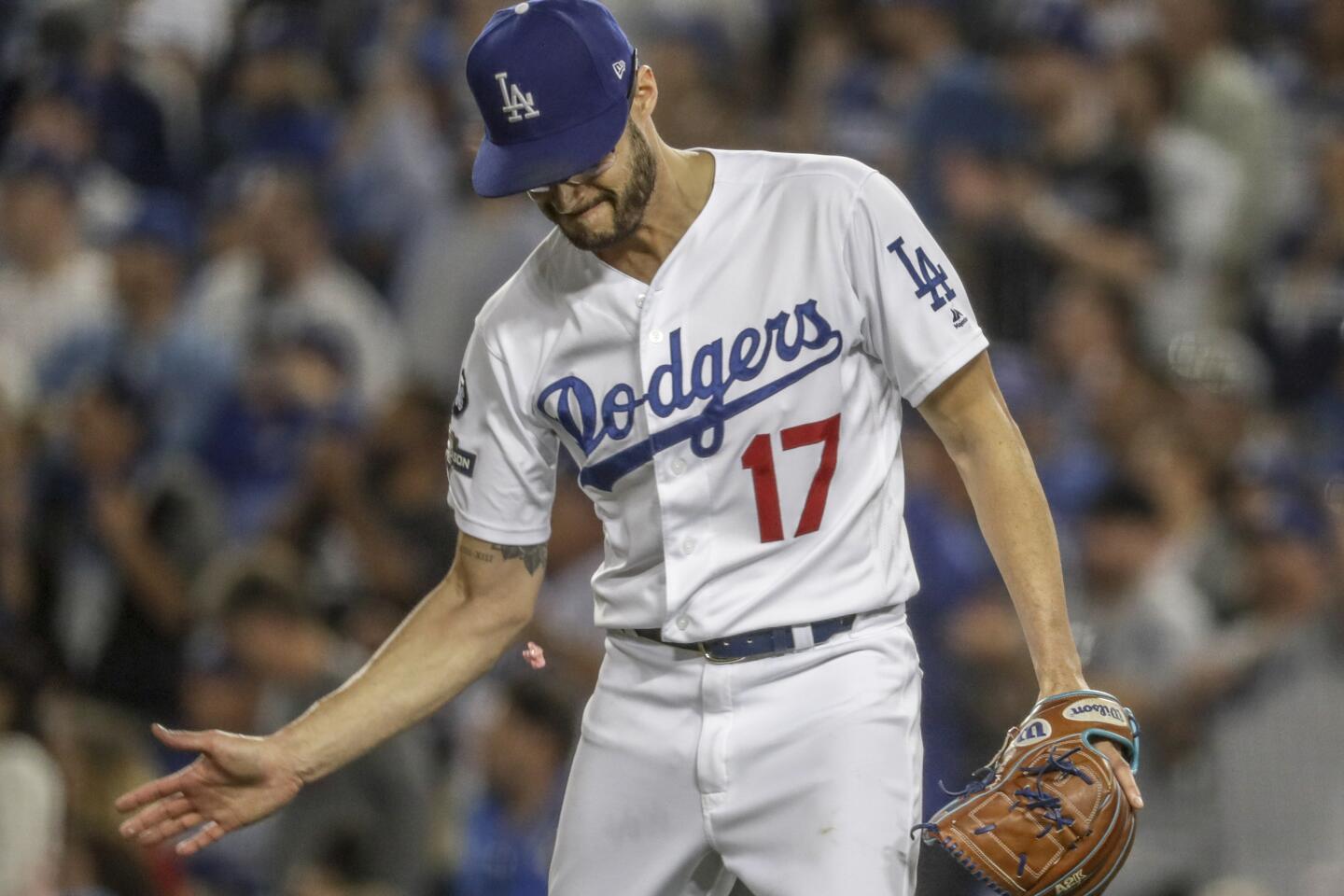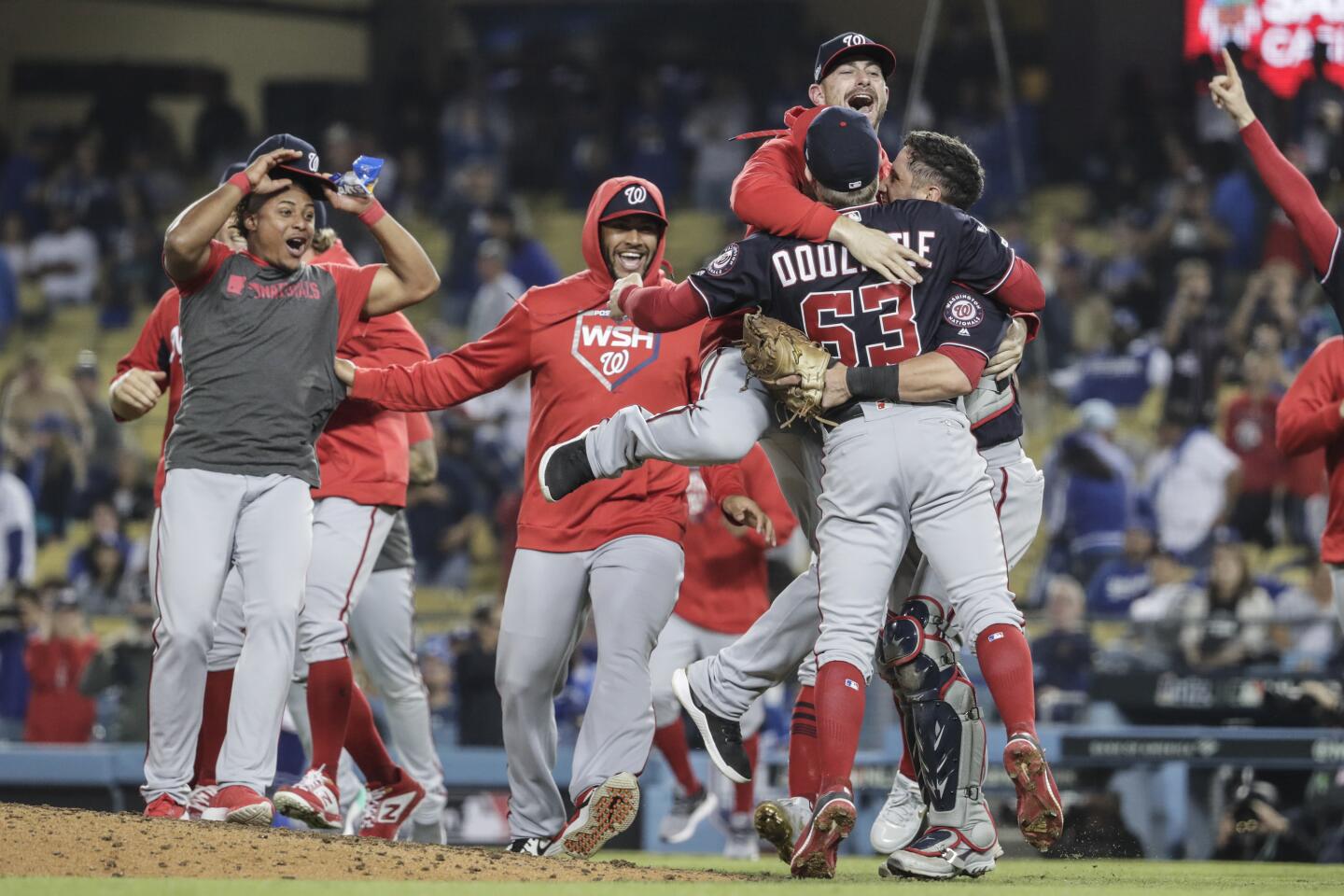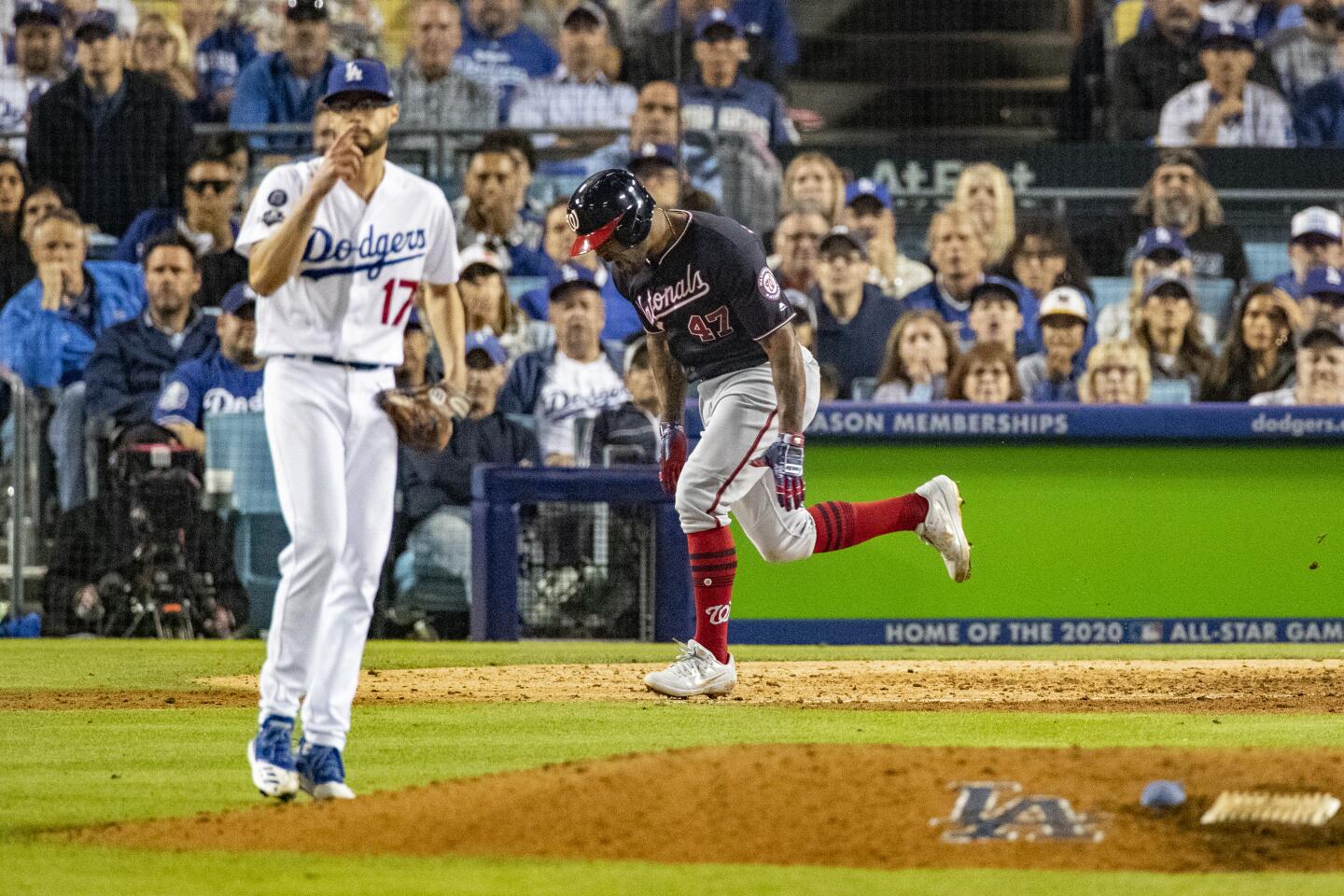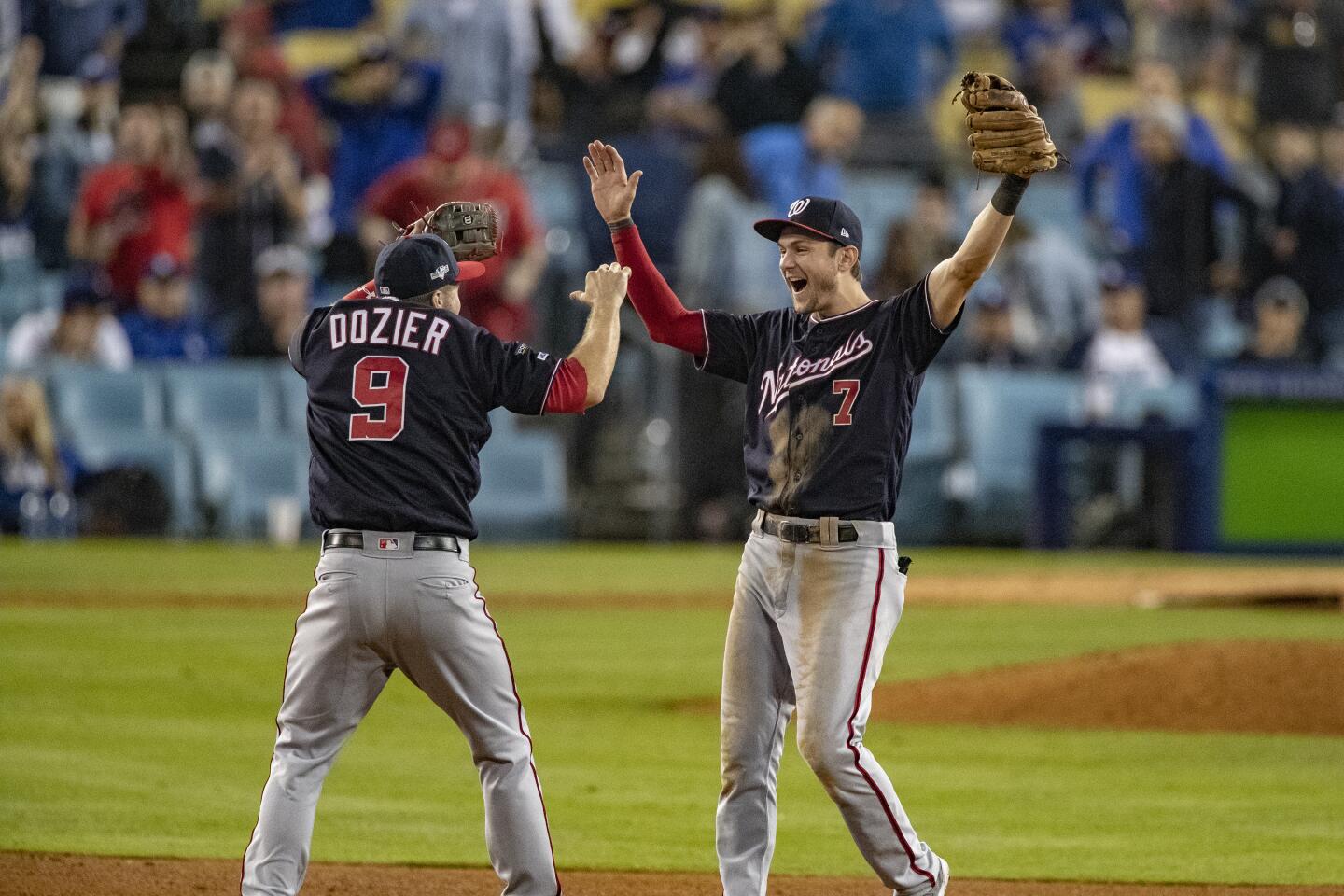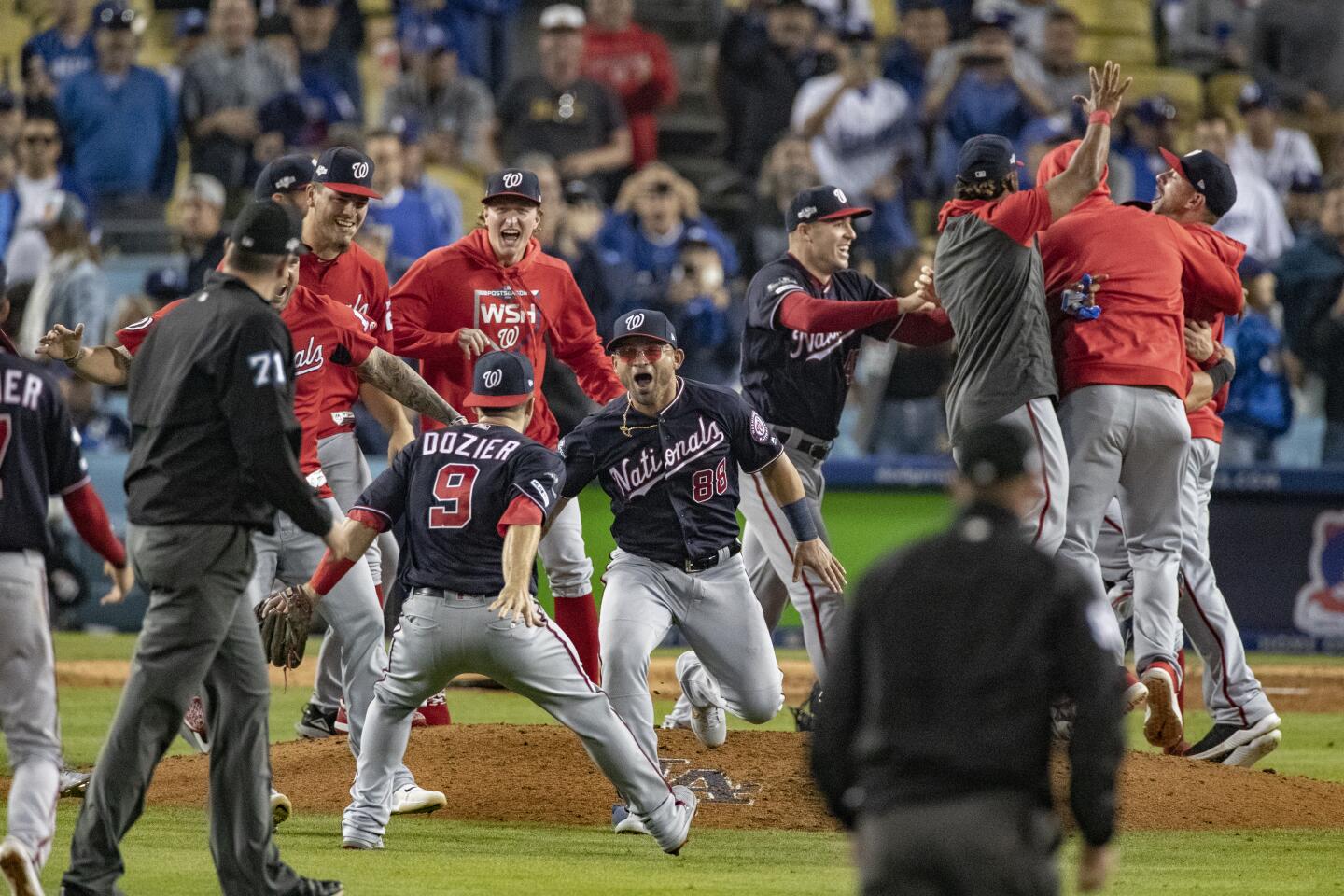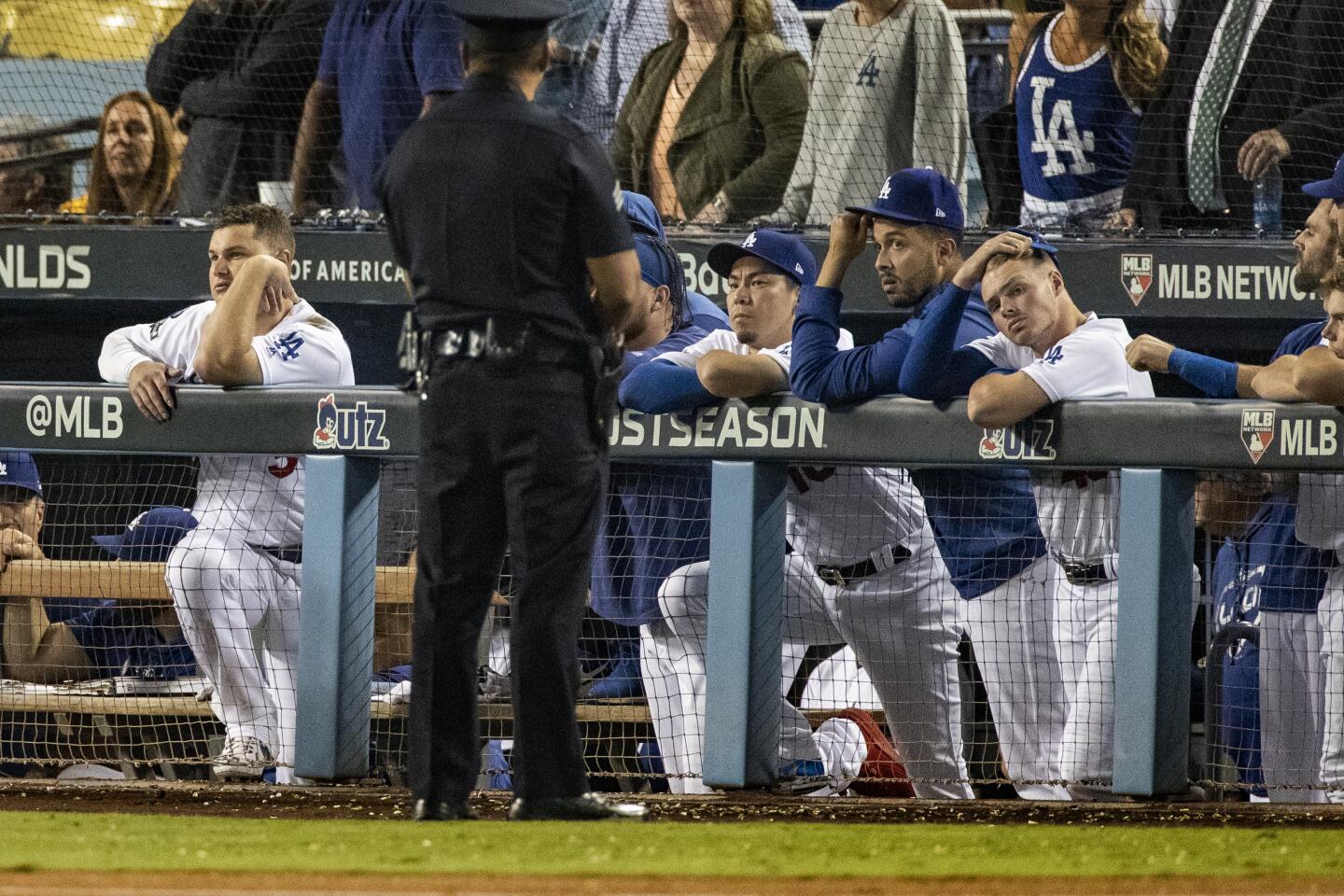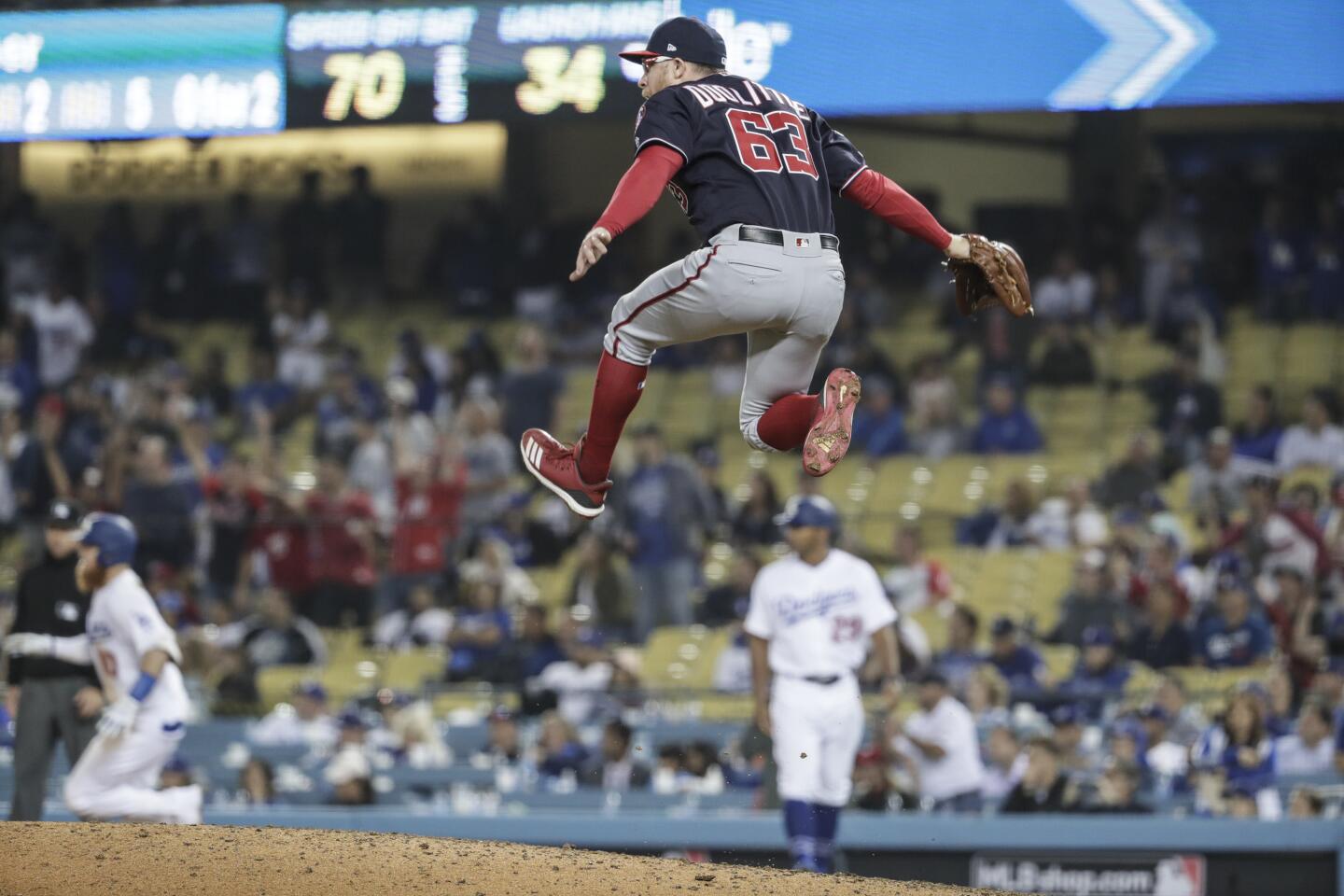Dodgers manager Dave Roberts hears boos, but keeps his job, and that’s good news
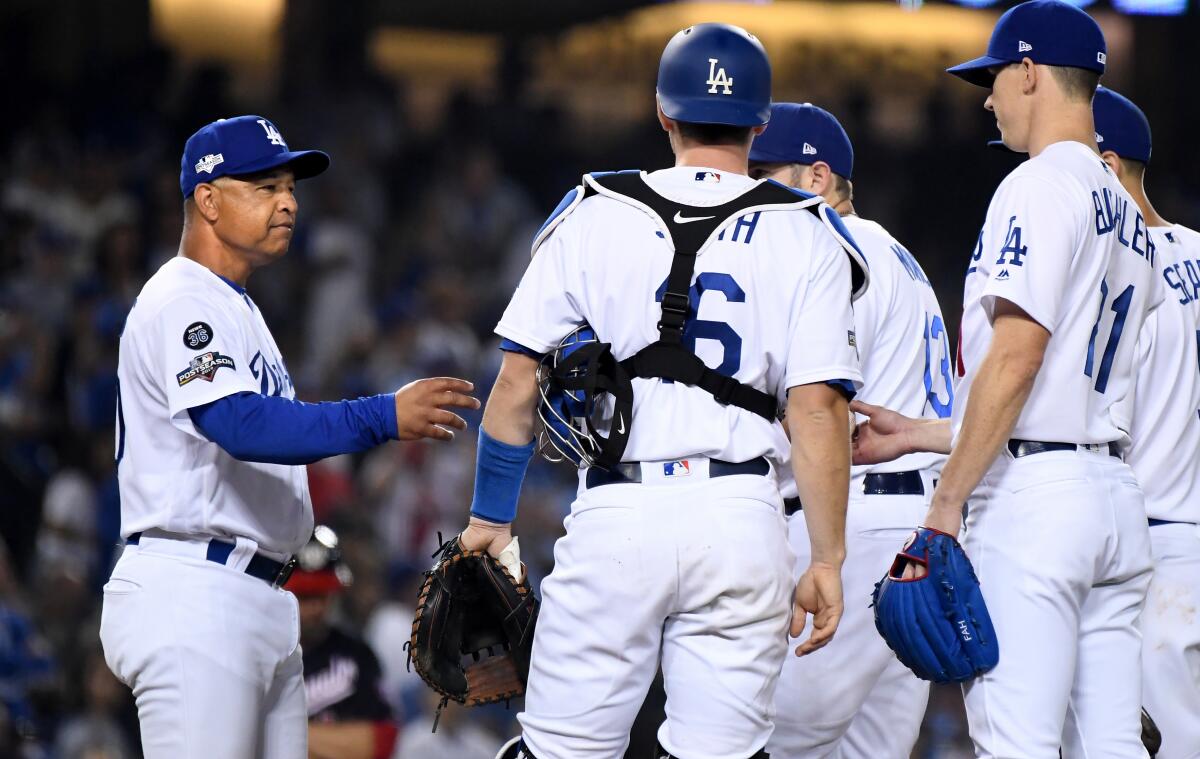
- Share via
Three slasher flicks, same final scene.
Three Dodgers playoff exits, one lingering memory.
It begins with the appearance of the Dodgers manager as he leaves the dugout and steps up onto the Dodger Stadium field. It continues with him making a long slow walk to the pitching mound in a futile attempt to fix another fatal mistake.
Then -- loudly, angrily, incredibly uncomfortably -- it happens.
For three consecutive years, the Dodgers’ season has ended with Dodgers fans booing the living hell out of Dave Roberts.
They booed him for leaving Yu Darvish in the game too long against the Houston Astros in 2017. They booed him after he pulled Rich Hill too early against the Boston Red Sox in 2018.
All of which was mild compared to Wednesday night, in the 10th inning of the 7-3 loss to the Washington Nationals in the decisive Game 5 of the National League Division Series.
When Roberts came out to take the ball from the shelled Joe Kelly, the manager was booed like never before. This time, there was cursing, catcalls, cries for his job, jeers so intense that Chavez Ravine momentarily appeared to sag under their weight.
Dodgers manager Dave Roberts’ allegiance to Clayton Kershaw and over-reliance on Joe Kelly were only two of the perplexing moves in the loss to the Nationals.
In 31 years of following Dodgers baseball, I’ve never heard a Dodger receive so much verbal abuse during the playoffs. Never has the outrage felt so directed, the derision so personal, the animosity so permanent.
Thanks to Roberts, the path between the dugout and the pitching mound in October has become Dodger Stadium’s Heartbreak Hill, and he has been routinely pummeled every step of the way, and now you have to wonder.
Where does he go from here? Is there anywhere to go from here?
Well, to start with, he is not getting fired. He will return next summer for his fifth season as Dodgers manager. The news was broken Thursday by The Times’ Jorge Castillo.
And no matter what those boos might say, this is good news.
Yes, if the Dodgers wanted to fire Roberts, they could have done it right now and the backlash would be minimal. Andrew Friedman could whisk his old pal Joe Maddon out of the clutches of the Angels, hold a festive news conference and give everybody renewed hope that next year, finally, will be different.
But that’s the impulsive move. That’s the shortsighted move. Friedman created five division championship teams by pointedly being neither.

They should not and will not fire Roberts because, annually, his six months have outweighed his Octobers. This is a guy who has spent the last four summers splendidly serving as the calm curator for a clubhouse constantly in transition. This is the genial face of the team, the strong keeper of the culture, the tough leading man of the detailed front office script, and a guy who has yet to finish a regular season outside of first place.
You don’t fire him, you work with him. You discuss the thinking behind his misguided late-game postseason decisions, which, by the way, do not come from some 3 p.m. front-office blueprint. By the time the seventh inning arrives, contrary to popular opinion, Roberts is using guidelines but usually working on his own.
Figure out where and how it’s going wrong. Give him the tools, and at least another chance, to make it right. A manager who just led the team to a franchise-record 106 wins is a manager worth saving. Don’t fire him, save him, by helping him save himself.
“If the blame falls on me, I’ve got no problem with it,” Roberts said late Wednesday night. “I feel it is my job to put guys in the best position to have success, and if it doesn’t work out, there’s always going to be second-guessing and I’ve got no problem wearing the brunt of that.”
The problem with Wednesday was that he was first-guessed. The misjudgments were that obvious. I was receiving screaming texts from friends before the real screaming began.
You don’t let Clayton Kershaw take the mound in the eighth inning after he had his magic moment with a three-pitch strikeout of Adam Eaton to end the seventh. Kershaw had done his job. He had succeeded outside of his comfort zone. He’s not used to coming out of the bullpen, and now you’re going to ask him to sit back down and come back out? Especially with his declining stuff and his October resume?
You don’t let Kershaw face the heart of the Nationals’ order at the most important moment of the game. You give that job to your hottest bullpen arm, Kenta Maeda, who, after Kershaw gave up the consecutive game-tying home runs to Anthony Rendon and Juan Soto, ended the inning by striking out all three batters he faced, all swinging.
“I’ll take Clayton any day in that situation,” Roberts said, and that was problem.
The Dodgers need answers to many questions after being eliminated by the Washington Nationals, but the identity of their ace isn’t one of them.
Roberts is too blindly loyal to realize two things: Clayton is no longer Clayton, and, in the postseason, Clayton has never been Clayton.
Then, in the 10th inning, you don’t let Joe Kelly return to the mound even after his hitless ninth. He had not pitched more than one inning since late August. Your longtime closer Kenley Jansen was ready. Your lefty specialist Adam Kolarek was prepared to own Soto again. Pedro Baez and Dustin May were there for an out or two. You had options.
“Don’t have a lot of guys as far as behind Kenley,” Roberts said later, adding, “I liked Joe right there in that spot, I really did.”
That tells you that while he trusted Kershaw too much, he didn’t trust the rest of his bullpen enough, not even a guy — Kolarek — who was acquired at the trade deadline for specifically this situation. It was almost as if Roberts froze in the moment, so much that even after Kelly had given up the game-deciding grand slam to Howie Kendrick, Roberts left him on the mound to face two more batters. How is that even possible? One of the only possible explanations is that Roberts had been momentarily crushed into a coma like most everyone else in Dodger Stadium, and that’s not good.
Roberts mismanaged the late innings the same way he mismanaged the previous two Dodgers season-ending defeats, by leading with his heart instead of using his head.
It’s a good heart. It’s a strong heart. It’s the heart that led him to steal that base for Boston in 2004 that inspired one of the most memorable championship runs in baseball history. It’s the heart that has fostered a refurbished Dodgers culture that has given him four NL West titles in his four seasons.
But you need more than heart to navigate the late innings of a pressurized playoff game. You need vision, you need perspective, and you need the sort of calculating wisdom that, in the heat of the moment, often comes from another voice. Maybe give him another veteran dugout voice?
And, while you’re at it, don’t blame everything on him.
The collapse wasn’t Friedman’s fault, but it was worth noting that his failure to acquire a veteran reliever at the trade deadline ultimately haunted them again. In their final two games against the Nationals, both losses, the Dodgers used eight different relievers, yet just two were veteran setup guys. The Dodgers tried to shimmy through the playoffs with a makeshift group of bullpen arms, and they paid for it.
Also, while the offense put the team within six outs of a series victory, they suffered from the same lack of hitting smarts as in previous postseasons. They hit Stephen Strasburg hard early, but he adjusted, and most of them didn’t, and they didn’t score after the first batter of the second inning.
Cody Bellinger hit .211 and didn’t have an RBI. Corey Seager batted .150 without an RBI. A.J. Pollock batted 13 times and didn’t have a hit.
By the time Dodger Stadium abruptly closed for the winter for the 31st consecutive year without a World Series championship, there were plenty of reasons to boo. For a third consecutive year, virtually everyone chose to direct those boos toward the Dodgers manager.
They’re understandable, but wearisome, and now that he’s keeping his job for at least another season, it’s time for Dave Roberts and the Dodgers to work together to figure out how to make them stop.
More to Read
Are you a true-blue fan?
Get our Dodgers Dugout newsletter for insights, news and much more.
You may occasionally receive promotional content from the Los Angeles Times.

